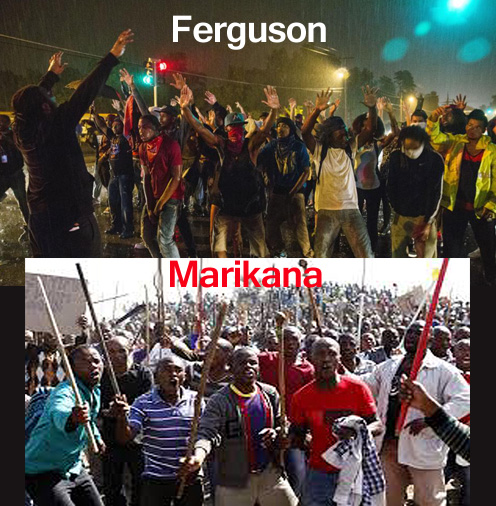 Like few other American news stories the Ferguson unrest is widely reported in the African media. Analysts and reporters alike are essentially claiming that America is “like the pot calling the kettle black.”
Like few other American news stories the Ferguson unrest is widely reported in the African media. Analysts and reporters alike are essentially claiming that America is “like the pot calling the kettle black.”
It’s hard to dispute. But the killing of Michael Brown will ultimately be judged excessive use of police force, and in my opinion, the policeman will go to jail.
That’s where much of the African perspective fails. Jumping on this event before it plays out allows African analysts to presume we won’t reach the justice in this catastrophe that I think we will.
As is much more often the case in Africa than America.
Nevertheless, the Africans have a valid pinger right now.
The loudest criticism comes from the dictators:
“The changes of story are a maddening example of police obfuscation, racial bias in policing and how television news in particular often undercuts the stories with images that exacerbate racial stereotypes,” writes an American resident Zimbabwean for its mouth-piece newspaper, The Herald.
The day the incident occurred in Ferguson, The Herald and many other newspapers in Africa quickly reported the UN’s interdiction of the police force there:
“The US Government that hypocritically accuses Zimbabwe of alleged human rights abuses has come under fire from the United Nations over the wanton shooting of an 18-year old black man in Missouri that prompted widespread demonstrations.”
This, of course, is hypocrisy on hypocrisy as Zimbabwe is right now about the cruelest society with regards to free speech that exists. But that’s the incredible destruction of hypocrisy: it can be used so easily to support both its ends.
The other great suppressor of democracy, Egypt, was almost as vocal.
Cairo’s newspaper, Aswat Masriya, said that the Ferguson police response has “led to questioning whether the incident reflects a larger trend of local police excesses” in America.
Egypt’s crackdown on dissidents since the end of the Arab Spring has been incredibly tough. “Police excesses” hardly begin to truly report the brutality.
(By the way, the U.S. State Department in its unending attempt to befriend Egypt again, immediately said it “respected” Egypt’s criticism. That, too, was reported in Egypt.)
But dispense with all this hyperbole, however momentarily nonhyperbolic it may be, and there are some very thoughtful and I think valid criticisms coming out of Africa.
“When the overwhelmingly white police department in Ferguson … some of whom are Israeli trained, responded … they brought in equipment first used in the Iraq war,” writes one of my heroes of analysis in Africa, Richard Pithouse, a professor at Rhodes University in South Africa.
Pithouse is echoing many of us Americans who believe local police departments have been militarized, an almost inevitable aftermath of winding down imperial wars abroad.
Pithouse quickly picked up on valid analogies between Ferguson and Gaza, for example:
“Unsurprisingly people in Gaza started sending advice to people in Ferguson via twitter about how to deal with stun grenades, tear gas and all the rest.”
“Just as the same water cannons are used in Gaza, Port-au-Prince and Ferguson, as well as the shack lands of Brazil and South Africa, so too are the same ideological operations repeated,” Pithouse concludes.
His astute analysis repeats what many contemporary historians believe, that immoral colonialism when abandoned abroad will circle around and eventually be applied at home. In other words, the ideology once adopted is impossible to discard.
So when the colony is set free, the colonial power will sic on itself.
I agree with Pithouse, and I think Ferguson is an excellent example. But I’m more optimistic than him. I believe we can learn from, rather than be imprisoned by these historical paradigms.
South Africa recently released an official report on police brutality at the Marikana mine two years ago that was considerably more horrific than Ferguson, today.
Pithouse acknowledges this and bemoans the response of his own government to its own admissions. I think America in this case might do better.
That, of course, remains to be seen.